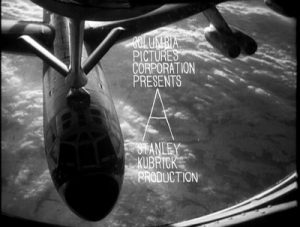I was fully prepared not like Dr. Strangelove. I am not usually a fan of movies which are, for lack of a better term, weird. Last semester, one my classes showed us the clip of Dr. Strangelove’s alien hand choking him. I don’t recall how this tied in to what we were learning, but I do remember thinking to myself that this was not a movie I needed to see more of. I should not have judged a book by its cover, so to speak.
Dr. Strangelove is an undeniably funny movie. But, some of the films funniest moments are also some of the most unsettling. The film works so well because it gets us, as viewers, to feel both amused and disturbed simultaneously.
My favorite scenes were those involving the B52 bomber crew. If you had to choose who in Dr. Strangelove is the “protagonist”-the one whose story we as the audience are following, the one who strives-I would say it is the bomber crew, more so than the cast in the war room or at the base. To me, the protagonist is the character with whom the audience is asked to identify. The President and his generals are played as jerks and fools-you wouldn’t see yourself as one of them. I suppose Lionel Mandrake’s actions are the most hero-like, but he spends most of the story locked up with a crazy general, and bogged down in a lot of awkward references to said general’s “essence”. He’s played more as pitiable. In any other film, the B52 bomber crew would be the ones you root for, hands down. Their story line-scrappy American underdogs defeat long odds-is a mainstay of American cinema. We come into the film hardwired, so to speak, to like these characters. We feel sympathy for them-when a missile almost destroyed the plane, I, at least, crossed my fingers for it to miss-even though we know the success of their mission will bring about the end of the world.
Kubrick is making a point about the stupidity of American nationalism, and he does it very well. Perhaps the most effective moment in the whole film comes when general Turgidson explains to the President that, even with the entire Russian air force looking for them, there is still a chance the bomber will slip through. He’s holding his arms out like a plane, proudly bragging about the superiority of the American bomber crew. Then, his face falls, when he realizes that if the plane does get through, the result will be the end of the world.
In the doctrine of MAD, Americans essentially believed that the way to keep ourselves safe was to keep building deadlier and deadlier weapons, to believe in and to maintain our military superiority to Russia. Kubrick suggests that what we were really doing was rushing headlong into oblivion, with Russia right behind us.
Ultimately, the mark of a good film is whether you find something new every time you see it. The Dr. Strangelove Wikipedia page says that the last scenes from the film are the explosions from the Russian doomsday device. I guess I must have misinterpreted the last few lines of dialogue-I thought it was America bombing Russia, trying to avoid the “mineshaft gap” by obliterating Russia, so that we could inherit the world, once the radiation subsided and humanity could emerge again. Which would have been perfect, considering America spends the rest of the film trying desperately to not bomb Russia. But, knowing that’s not how it really ends, I guess it will feel like a whole new film the next time I watch it.

